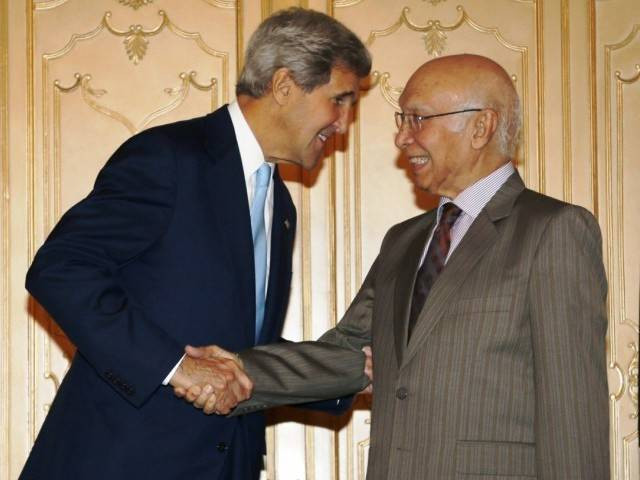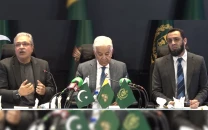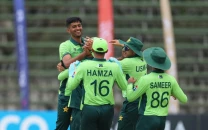US drone strike in Balochistan vitiated bilateral ties: Sartaj Aziz
High-level US delegation calls on Adviser to PM in Islamabad, army chief in Rawalpindi

Prime Minister’s Adviser on Foreign Affairs says Washington abandons Islamabad when it doesn’t need help PHOTO: REUTERS/FILE
A high-level US delegation called on Adviser to PM and Foreign Secretary Aizaz Ahmed Chaudhry on Friday, a Foreign Office statement said.
Ambassador Richard Olson, US Special Representative for Afghanistan and Pakistan and Dr Peter Lavoy, Senior Adviser and Director for South Asian Affairs at the National Security Council comprised the US delegation, it added.
 PHOTO: PID
PHOTO: PIDThe participants held candid discussions on bilateral relations, regional security situation and Afghan peace process in the wake of drone strike in Naushki area on May 21 that killed Afghan Taliban chief Mullah Akhtar Mansour.
Aziz told the delegation that the airstrike was a breach of the principles of the United Nation’s charter and made it clear that any such attacks in future will be detrimental to common desire of strengthening relations.
Pakistan hints at reassessing US ties
He said the strike had seriously undermined ongoing efforts for Afghan peace and reconciliation process.
The strike occurred at such a time when Pakistan, along with other Quadrilateral Coordination Group (QCG) countries, was engaged in efforts to revive talks between Afghan government and Taliban.
Foreign Secretary Chaudhry recalled that it was decided in the fifth QCG meeting on May 18 that peace negotiations remained the only option for a political settlement.
He insisted it would require collective efforts on the part of all QCG members to promote lasting peace in Afghanistan.
In response to US queries on safe havens for Taliban, it was emphasised that Pakistan was already pursuing its objective of eliminating all militants and terrorists from its soil in accordance with the National Action Plan.
At the same time, the country would have to safeguard its own security through better border management and early repatriation of Afghan refugees.
Pakistan said it also expected action by Afghan forces against the operatives of Tehreek-e-Taliban Pakistan (TTP) in Afghanistan. These steps would also help promote better relations between Afghanistan and Pakistan and reduce mistrust, it maintained.
Dr Peter Lavoy, while conveying US President Barack Obama’s good wishes for the Prime Minister Nawaz Sharif's speedy recovery, said that Obama was committed to improving relations with Pakistan as highlighted during Nawaz’s visit to Washington in October 2015.
Pakistan has signalled that it may reassess its ties with the United States in the wake of recent developments, including closer defence ties between Washington and New Delhi.
China tells world to respect Pakistan’s sovereignty
“Relations between Pakistan and the US need to be reassessed,” said Aziz at a news conference on Thursday.
Speaking against the backdrop of apparent strains in ties between the US and Pakistan as a result of the recent drone strike in Balochistan, the adviser conceded that Washington “abandons us when it doesn’t need our help.”
“This has been happening for the last 60 years. The US approaches Pakistan whenever it needs our help but abandons us when its objectives are achieved,” he said.
US delegation calls on army chief
Later, the high-level US delegation, including General John Nicholson, Commander Resolute Support Mission in Afghanistan, called on Chief of Army Staff General Raheel Sharif at Pakistan Army’s General Headquarters in Rawalpindi, a statement issued by the military’s media wing said.
 A high-level US delegation calls on Army chief General Raheel Sharif at General Headquarters in Rawalpindi on June 9, 2016. PHOTO: ISPR
A high-level US delegation calls on Army chief General Raheel Sharif at General Headquarters in Rawalpindi on June 9, 2016. PHOTO: ISPR“Regional security situation with particular reference to border management and peace and stability in Afghanistan in the post May 21 US drone strike environment came under discussion,” the ISPR said.
According to the statement, the army chief expressed his serious concern over the US drone strike in Balochistan.
“COAS highlighted as to how it had impacted the mutual trust and respect and was counterproductive in consolidating the gains of operation Zarb-e-Azb.”
The army chief upheld that terrorists of all hues are being targeted without any discrimination during Zarb-e-Azb.
“All stakeholders need to understand Pakistan’s challenges with regard to porous border, inter-tribal linkages and decades-old presence of over three million refugees. Blaming Pakistan for instability in Afghanistan is unfortunate.”
Raising the demand of targeted the banned Tehreek-e-Taliban Pakistan (TTP) and its chief Mullah Fazlullah in their bases in Afghanistan, General Raheel reiterated Pakistan’s resolve not to allow hostile intelligence agencies’ efforts of fomenting terrorism in the country.


















COMMENTS
Comments are moderated and generally will be posted if they are on-topic and not abusive.
For more information, please see our Comments FAQ